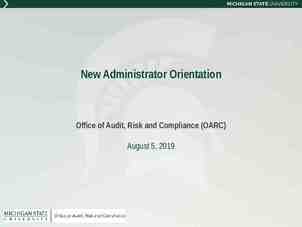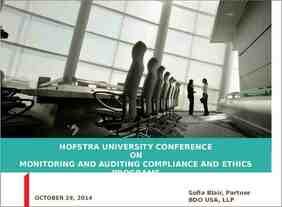El Niño: Riverside County Prepares Winchester/Homeland Municipal
27 Slides9.72 MB

El Niño: Riverside County Prepares Winchester/Homeland Municipal Advisory Council

Many Responsible for Flood Management Riverside County Flood Dams, levees, basins Regional channels and storm drains Cities/County Road culverts Smaller storm drains ( 36”) Catch basins (roadside inlets) Rural Property Owners/HOAs Minor drainage infrastructure Keep natural washes within private property free from obstruction

Presentation Outline El Nino and Flood Risk Property Preparedness Family Preparedness

What is El Nino? El Niño is a weather phenomenon that involves a warming of the Pacific Ocean west of Peru. The temperature increase can cause dramatic changes in weather patterns worldwide, bringing wet rains to California but drought to Indonesia and Australia.

Change in Jet Stream Delivers More Rain to Southern California L L L

Why is this one such a big deal? This El Niño is as strong as the record 97/98 El Niño Strong El Niños tend to predict wet years

Historic Rainfall Non-El Niño vs. El Niño 5 strong El Niños – 1958 (25”), 1966 (14”), 1973 (15”), 1983 (24”), 1998 (25”) Rainfall M o d e r a t e 30 25 Moderate 25” Very Strong 35 20 15 Avg. Annual 12” 10 5 2011 2005 1998 1991 1992 1993 1994 1995 1996 1997 1998 1999 2000 2001 2002 2003 2004 2005 2006 2007 2008 2009 2010 2011 2012 2013 2014 2015 1993 0

Another way to put it

1997-1998 Rainfall Most rain in a day: 2” Most rain in a month: 11” Total Rainfall: 25”

Atmospheric Rivers also a Concern Can Produce Intense Storms Riverside – Dec. 2010 1-day – 3.2” 5-day - 7.2” Temecula – Dec. 2010 1-day - 5” 5-day– 12.2” Murrieta Creek Mockingbird Canyon Road

Flood Control Preparations Complete inspection of facilities Flood-fight training for staff Mock-storm drills Emergency contracts with contractors and rock and equipment suppliers Public Outreach (Brochures, websites, presentations) Coordinating with City/County Departments and other local, state and federal emergency management agencies.

Information for Homeowners if Subject to Flooding Standard homeowner policies do not cover flood damage! Purchase Flood Insurance offered by the National Flood Insurance Program (Policy takes 30 days to activate) 1-888-Call-Flood www.floodsmart.gov

Community Specific Information Blank Slide Placeholder for local flood issues/concerns Highlights/projects Etc.

Property Preparedness Tips

Preventable El Nino Rain Impacts: Unprotected slope failures Retaining wall failures from blocked drain holes Collapsed commercial building roofs due to plugged roof drains Fallen trees Localized flooding from blocked drainage courses

Before the Storm Clean gutters and cut down weakened trees that could damage your home. Take care of grading or drainage needs on your property. Check for loose roof tiles or shingles, fix roof leaks. Store outdoor furniture and other objects that could be damaged by storms or thrown by winds. Inspect retaining wall drain holes, surface and subsurface drains and yard drains for signs of obstruction or malfunction. Establish native plants or place other ground cover on bare ground, slopes or freshly graded areas.

Before the Storm – Clear private drainages of obstructions Most flood-prone drainage areas of low-lying property will have a natural water courses that must remain clear of obstruction. Failure to maintain drainage areas can contribute to flooding of adjacent property. Riverside County Unincorporated Community Drainage Task Force Homeowner guidance for watercourse cleaning and slope stabilization; Guidance for removal of structures/walls/debris blocking drainage; Assistance with regulatory permitting; and Drainage junk/debris removal support. (951) 955-2004

Before the Storm –Stream Stabilization Contact the County to determine if local, state or federal permits are required before doing any of the following in a wash, stream, lake or river (whether or not water is flowing): Remove soil, rock or plant material from a streambed or bank; Place any waste, material or structures within or on the bank– even if to armor or stabilize; Divert, obstruct or otherwise modify the bed, channel or bank; or Dispose or deposit debris, liquid, solid waste or soil. Failure to do so may result in violations of local, state and/or federal law – Call (951) 955-2004 for assistance from the County

Before the Storm – Sand Bagging Stage and store sand and sandbags before the storm. You can obtain sand and sandbags from the local hardware store. For information regarding how to fill a sandbag: http://www.rcflood.org/FloodSafety.aspx Sandbags will last as long as they don’t have a hole. If the bags are reusable, residents should keep them for the next major rainstorm. To discard, distribute sand in a flower bed or over a lawn, and then throw away the empty bags. It is illegal to dump sand in a stream, in the gutter, or in the storm drain system.

Family Preparedness COUNTY OF RIVERSIDE EMERGENCY MANAGEMENT DEPARTMENT (951) 955-4700 WWW.RIVCOREADY.ORG

During the Storm Avoid unnecessary trips, only travel in emergency situations. DO NOT “sightsee” in flooded areas. DO NOT attempt to go around barricades. DO NOT try to cross low water crossings that have flowing water. Two feet of flowing water can move a 2,000 pound car. 6 inches of water can sweep you off your feet.

During the Storm In an emergency dial “911” Clogged channels – call 951.955.1230 Clogged inlets, road culverts, roadside ditches – call 951.955.1230

Make a Kit Start by considering what hazards you are vulnerable to: flooding, power outages, earthquakes, etc. Consider what, if any, equipment, medication, phone numbers or supplies you will need to sustain your needs and or maintain basic comfortability. Here are a few ideas; for more ideas visit: www.rivcoready.org Assistive devices & medications Food (canned or Meals Ready to Eat (MRE) Water (1 gal/person/day minimum *don’t forget to add extra for pets and hand washing* Pet supplies (leashes, food dish, food, etc.) Contact lists Out of state contact(s) Cell phone charger (electric, solar, etc.) Flashlight & batteries Generator if possible Waterproof matches Light and warm clothing, rain poncho, hat, dry socks, etc. Non-latex gloves Hand sanitizer (evaporates over time, replace annually) Prepare for a minimum of three days (seven days is preferred) Preparing a kit doesn't have to cost a lot of money! You probably already have a lot of the things you will need Putting them together so you can quickly find everything when disaster strikes will give you piece of mind and help you cope with the disaster Utilize local stores where nothing is over 1.00 Don’t forget to plan for your pets!

Have a Plan Developing a plan doesn’t have to be overwhelming! Consider some basic points when creating a plan What are the family dynamics -do you have kids, elderly, medically fragile people in the home to consider? Do you travel a long distance from work, home or school, each day? Who will look after your home if you are away? Write down meeting place locations (primary, secondary) Identify travel arrangement plans (from work, to pick up kids, etc.) Store a list of important phone numbers in your kit – including your insurance provider* *most homeowners insurance policies do not include flood or earthquake coverage – call and ask! Keep a copy of your plan with your kit Make sure everyone who needs to know about your plan, does! Practice the plan from time to time to keep it fresh in your mind; make updates as necessary Know where to seek information about the disaster (i.e. local radio stations, websites, etc.)

Stay Informed Knowing where to get information before, during and after a disaster can have a direct effect on your ability to respond and recover! Knowing your local radio and news stations can help you stay informed! Here are some other information resources you should become familiar with: Before the disaster: www.rivcoready.org www.rcflood.org www.rvcfire.org www.redcross.org www.caloes.ca.gov www.fema.gov www.noaa.gov (weather) After the disaster: www.rivcoready.org www.rcflood.org www.connectriverside.org www.redcross.org www.caloes.ca.gov www.fema.gov During the disaster: www.rvcfire.org www.riversidesheriff.org www.dot.ca.gov www.noaa.gov

QUESTIONS / COMMENTS







